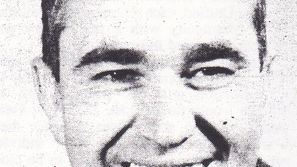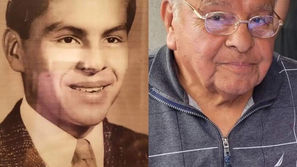MID unveils centennial book
- Bill Coate
- Sep 19, 2020
- 4 min read

Wendy Alexander/The Madera Tribune Pauline Emmert, widow of Steve Emmert, is joined by her family, from left, Steve McDougald, Wyatt Emmert, Cristin Toshi and Amy Cadenazzi as she looks through the first copy of the book “100 Years of Madera Irrigation District,” which was presented to the family during a meeting on Tuesday.
100 years of Madera’s irrigation history
The 100-year saga of Madera’s water adventures was unveiled Tuesday afternoon when Madera Irrigation District made a public presentation of its centennial history, written by Jeff Crider, an award winning author of agriculture and business.
In a ceremony shaded with emotion, MID Board President James Erickson, flanked by the other board members, presented “100 Years of Madera Irrigation District” to the family of Steve Emmert, who passed away suddenly this spring. Emmert, who was involved in local farming and irrigation all of his life, was instrumental in providing Crider with material for MID’s centennial history.
Emmert’s widow, Pauline, accepted the book on behalf of herself and the Emmert family. She was joined by Cristin Toschi, Wyatt Emmert, Steven McDougald, and Amy Cadenazzi.
Crider’s centennial history of the Madera Irrigation District blends the story of the district with photographs that span the history of Madera. The photographs were supplied by the digital archives of the California History Room in the Madera County Library.
Recognizing that the history of water in this part of the Valley precedes Madera Irrigation District by at least fifty years, Crider lays a crucial foundation to the story by painting the picture of what Madera County was like in the pioneer days. He tells how lumber created Madera and how farming evolved with an early recognition that somebody was going to have to build a dam, a reservoir, and some canals to supply irrigation water and to replenish the ground water.
Central to the early part of Crider’s narrative is the struggle between the proponents of water for agriculture on one hand and the “Cattle Kings” Miller and Lux on the other. The battle heated up with the creation of the first Madera Irrigation District in 1888. Leading this nascent attempt to provide water for farming was George Washington Mordecai, one of the founding fathers of Madera County. One of the opponents was Jonas Minturn, who brought the first agriculture to the Chowchilla area in 1870.
Led by Miller and Lux, the opponents of the first Madera Irrigation District took it to court and kept it there until its finances were exhausted and it had to disorganize in 1893, the same year of the formation of Madera County.
In 1920, the irrigationists tried again, and the response from the voters was overwhelming. The vote was 1,633 in the affirmative against 52 negative tallies. Opposition from Miller and Lux was not surprising, but G.W. Mordecai’s dissent surprised not a few. The head of the first Madera Irrigation District opposed the second MID because he had plans for a smaller irrigation district of his own. As the years rolled on, the struggle over irrigation included a continued fight with Miller and Lux in the context of a greater number of family farms in Madera and a subsequent ground water overdraft. Ultimately the Feds stepped in, and a new era emerged.
It began when the frustration of the irrigation districts in the San Joaquin Valley pulled the state into the storm because of the seemingly endless fight with Miller and Lux. What resulted was a statewide irrigation system known as the Central Valley Project that ultimately required help from Washington D.C.
The state couldn’t find the money to fund the Central Valley Project, so the U.S. Bureau of Reclamation took it over in 1935. It paid Miller and Lux $2.5 million and offered to buy the Friant Dam site and MID’s San Joaquin River water rights. In 1939, it paid MID $300,000 for the dam site and promised that the Madera Canal would run from Friant to Ash Creek.
Crider went on to write that on June 4, 1944, MID President J.A. Secara opened the valve that poured water from Millerton Lake into the Madera Canal, representing the conclusion of a “50-year effort in which residents of the county have spent more than $1,000,000 to obtain an irrigation supply from the San Joaquin River.
Crider continues to exhibit his skill as a researcher and his expertise in water management as he deals with the second half of MID’s 100-year-history. He charges with complete abandon into some of the most impenetrable dilemmas that any irrigation district could face.
Chowchilla created its own Irrigation District, seceding from MID. The Madera Taxpayers Association tried to dissolve the district, and Harry Barnes, the district’s engineer for 30 years and almost a demigod to some, was asked to resign his position.
Then there were the fights over the 160 acreage limitation, and new threats from environmental and sport-fishing groups who sought to restore salmon runs along the San Joaquin River. This cost Madera County farmers 18 percent of their Friant Dam water.
Then there was that brouhaha over the Madera Ranch water bank. Support for the idea seesawed back and forth until Stanislaus businessman Herber Perrett made $13.5 million by selling the ranch to Azurix, a subsidiary of Enron, which went bankrupt a couple of years later.
Thus, in “100 Years of Madera Irrigation District,” Crider shows the reader the highs and the lows; he doesn’t hide the challenges Madera Irrigation District faced over its first 100 years. He has given us the truth, and the truth is cause for celebration.
As William Butler Yeats has reminded us, the writer must use the fullness of language to give us the soul of his thoughts. Jeff Crider has done that, writing with the knife-crystal’s edge of sharpness as he lifts the reader beyond the prose surface of the page. He has given Madera a treasure. In keeping with the publication of MID’s first 100 years, a celebration has been planned for Friday, Oct. 2, at San Joaquin Winery — 21801, Ave. 16.
To reserve tickets, please call 559 – 673-3514–ext. 215 or online at https://midcentennial.eventbrite.com.
Ticket reservations end Sept. 23.


























Comments